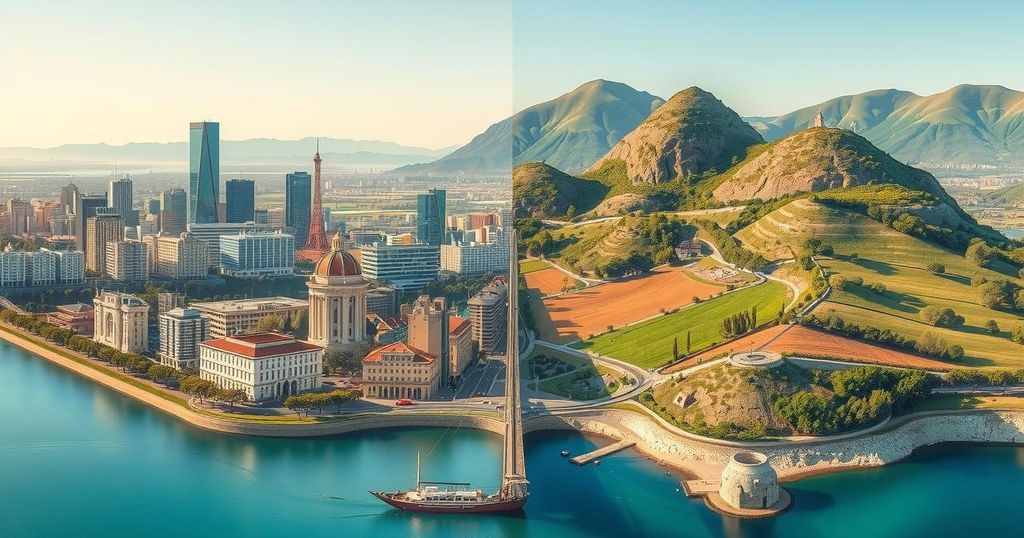José Mujica, Uruguay’s former president and charismatic guerrilla leader, passed away on May 13. He was a complex figure, embodying tensions between urban socialism and rural conservatism in Uruguay. His presidency featured significant reforms, like legalizing abortion and same-sex marriage, but left the country with substantial debt and unmet promises, making his legacy highly divisive.
On May 13, José Mujica, a prominent figure in Uruguay’s political landscape who transformed from a guerrilla fighter to president, died. For those unfamiliar with Uruguay, explaining Mujica’s significance is tricky. His unique mix of characteristics embodies the two conflicting facets of Uruguay: an urban, middle-class social democracy and a more conservative, rural populace suspicious of government interference. These divisions, historically entrenched and sometimes violent, have shaped the nation’s political scene since its independence.
Mujica himself stood as a peculiar blend of these worlds. His journey from being part of the Tupamaros guerrilla group to becoming president in 2010 is remarkable, as it hints at a redemption arc that seems almost cinematic. Initially imprisoned for his radical actions—prompted by what they deemed as economic injustices—Mujica later turned to democracy, leading his former comrades into mainstream politics. Through charisma and a straightforward, often unfiltered approach, he gained immense support by canvassing the country, truly engaging with citizens across both urban and rural areas.
Despite his humble lifestyle, which famously fueled tales of him being the “world’s poorest president”—like riding a battered scooter to Parliament and maintaining a modest homestead—there’s complexity behind this persona. Though he marketed himself as just another struggling citizen, his wife came from wealth. The narrative continued to grow, especially as he received foreign dignitaries while maintaining his unpretentious charm, often sitting them on chairs made from recycled bottle caps.
However, Mujica’s political legacy splits opinion sharply. Many admire him, but others see him as detrimental. His presidency coincided with a regional economic boom, yet he passed on a greater national debt to his successors. Furthermore, he left a state energy company in shambles, which raised eyebrows given the promises he made regarding necessary reforms. Education, one of his declared top priorities, saw little progress during his time in office.
On social issues, Mujica’s government did take significant strides by legalizing abortion and same-sex marriage, and by regulating marijuana sales. Oddly enough, Mujica didn’t advocate for these reforms before becoming president but adopted them once he sensed their popularity, especially among younger voters—a group he often criticized. This adaptability showcases his perceptiveness and political savvy, yet many felt it lacked authenticity.
Moreover, Mujica’s brashness altered the political discourse in Uruguay. He frequently bypassed traditional decorum in public speaking, favoring coarse language which some argue has led to a decline in civil discourse across political debates. Critics have likened him to figures like Donald Trump, noting that while their ideologies differ, they’ve both disrupted established manners in political rhetoric.
Even in his final days, Mujica remained politically active, urging support for his successor, Yamandú Orsi. Many analysts credit his endorsement as a significant factor in Orsi’s electoral success. Mujica’s blend of contradiction—taking aim at both business and labor leaders alike—demonstrated his complex political identity. He maintained a staunch socialist stance even while critiquing communist regimes, all while forming friendships with diverse political figures. Ultimately, Mujica knew how to resonate with the emotions of everyday Uruguayans like no other.
In essence, one could argue Mujica’s political prowess could have served a nobler purpose, achieving grander outcomes. However, in an era filled with polished, image-conscious politicians, his authenticity and unpredictability were rare qualities.
José Mujica’s life and political career reveal a fascinating dichotomy within Uruguayan society. He emerged from guerrilla roots to charm a complex nation, embodying both sides of its political spectrum. His presidency remains contentious, marked by social reforms and economic challenges. While some praise his progressive policies and grassroots approach, others criticize the debt and failures on educational priorities. Mujica’s legacy is undoubtedly multifaceted, reflecting the rich, conflicted history of Uruguay itself.
Original Source: www.eurasiareview.com






